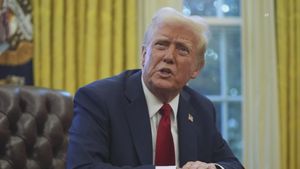Marco Rubio, the United States Secretary of State, made his inaugural diplomatic trip to Panama on Saturday, amid rising tensions surrounding the strategic Panama Canal. This visit marks the beginning of Rubio's efforts to navigate the complex foreign policy directives set by President Donald Trump, particularly concerning the growing influence of China in Central America.
Arriving at the canal, Rubio's mission is underscored by Trump's extraordinary threat to retake control of this pivotal waterway, which the US relinquished to Panama at the end of 1999. "We think it's more appropriate to take back control of the Panama Canal. They've violated the agreement by allowing China to have too much influence," Trump declared prior to Rubio’s departure.
Trump's remarks echo concerns over the rising dominance of Chinese investments in the region. The US President has not ruled out the possibility of military action, emphasizing what he sees as urgent national interests at stake. "Marco Rubio is going over to talk to the gentleman that's in charge," Trump added, alluding to the discussions Rubio would engage in with Panamanian President Jose Raul Mulino.
During the visit, Rubio is expected to address the Panama Canal’s significance, which serves as the linchpin for 40 percent of US container traffic, facilitating trade between the Atlantic and Pacific Oceans. Rubio, acknowledging the canal's importance to US interests, stated, "We cannot allow any foreign power, especially China, to maintain control of the canal. This situation cannot continue." His sentiment reflects the heightened anxiety within the Trump administration concerning China's increasing footprint throughout Latin America.
President Mulino’s response has been unwavering. He has outright refused to negotiate over the canal, reiteratively stating, "I cannot negotiate, much less open a negotiation process for the canal. The canal belongs to Panama." His firm stance is viewed as both patriotic and pragmatic, protecting Panama’s sovereignty against overt US pressures.
This diplomatic mission is particularly noteworthy as it departs from traditional approaches taken by previous secretaries of state, often beginning their terms focusing primarily on cooperation with established allies. Instead, Rubio’s trip lays out Trump’s aggressive foreign policy posture, which also includes imposing steep tariffs on neighboring countries, including Canada and Mexico.
While evaluating the economic relationship between the US and Panama, tensions surrounding trade and investment present another layer of complexity. Trump’s administration has previously placed blame on the former president of Panama, Juan Carlos Varela, for severing ties with Taiwan and embracing China, which has allegedly led to increased costs and complications for US shipping interests.
The upcoming conversations between Rubio and Mulino serve as indicative of the shifting dynamics within US-Panama relations. The audit ordered by the Mulino government of CK Hutchison Holdings, which operates ports around the canal, points to underlying disputes exacerbated by economic dependencies and environmental challenges, such as droughts attributed to climate change, which have impacted operational costs.
Rubio’s tour of Latin America, which will also extend to countries like El Salvador and Costa Rica, showcases the administration's emphasis on migration, as troubles at the US southern border grow. Many stakeholders see this trip as not merely ceremonial but pivotal to reassess and reinforce alliances, especially concerning economic and security cooperation.
The intersection of trade, military posturing, and diplomatic engagement will be carefully monitored as Rubio advances his agenda. Trump’s administration is likely to leverage this trip as part of its broader narrative on national security—one where the Panama Canal emerges as both opportunity and potential flashpoint.
Comparatively, as Rubio navigates these delicate discussions, many experts suggest the United States could secure increased investments without direct confrontation, with the prospect of elevizing US interests through collaboration instead of coercion.
Concluding his trip, Rubio’s efforts will significantly shape the discourse around US engagement with Panama and broader Central America. The stakes are particularly high as both diplomatic negotiations and trade routes are weighed against the backdrop of geopolitical rivalries, not least of which is China's looming presence.
The results of this diplomatic maneuvering will not only impact US-Panama relations but will cast longer shadows over how the US engages with its neighbors and addresses challenges at its southern border. The pivotal conversations and actions taken during this trip are sure to resonate far beyond Panama, influencing the fabric of international relations within the hemisphere.



